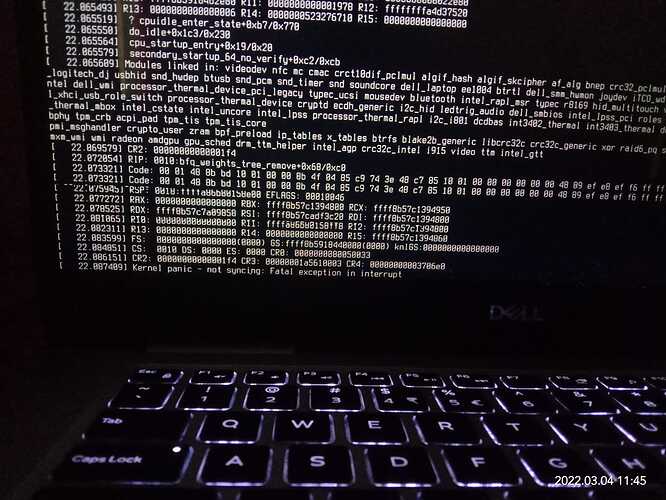Hello ,
Some days ago I wanted some extra performance for sometime as I had some kind work which required two or three times video rendering,
So I decided to install performance-tweaks to gain that but when I restarted my PC then it showed me this :
I was not able to go to log in screen and the caps lock button was continuously blinking , at that time I thought that this may get away after some updates but still the problem is same, currently I am using auto-cpufreq but it would be great if I would be able to get performance tweaks ... ![]()
Thanks in advance ![]()
garuda-inxi :
╭─ankur@ankur in ~
╰─λ garuda-inxi
System:
Kernel: 5.16.11-1-cacule x86_64 bits: 64 compiler: gcc v: 11.2.0
parameters: BOOT_IMAGE=/@/boot/vmlinuz-linux-cacule
root=UUID=3d8862a3-cc90-4161-81ad-195e8064062c rw rootflags=subvol=@
loglevel=3 quiet splash systemd.unified_cgroup_hierarchy=1
sysrq_always_enabled=1
Desktop: sway 1.7 info: waybar vt: 1 dm: greetd Distro: Garuda Linux
base: Arch Linux
Machine:
Type: Laptop System: Dell product: Inspiron 7570 v: N/A
serial: <superuser required> Chassis: type: 10 serial: <superuser required>
Mobo: Dell model: 06K08K v: A00 serial: <superuser required> UEFI: Dell
v: 1.16.0 date: 02/17/2020
Battery:
ID-1: BAT0 charge: 21.2 Wh (100.0%) condition: 21.2/42.0 Wh (50.5%)
volts: 12.6 min: 11.4 model: Samsung SDI DELL CYMGM79 type: Li-ion
serial: <filter> status: Full
Device-1: hidpp_battery_0 model: Logitech Wireless Keyboard
serial: <filter> charge: 55% (should be ignored) rechargeable: yes
status: Discharging
CPU:
Info: model: Intel Core i7-8550U bits: 64 type: MT MCP arch: Coffee Lake
family: 6 model-id: 0x8E (142) stepping: 0xA (10) microcode: 0xEC
Topology: cpus: 1x cores: 4 tpc: 2 threads: 8 smt: enabled cache:
L1: 256 KiB desc: d-4x32 KiB; i-4x32 KiB L2: 1024 KiB desc: 4x256 KiB
L3: 8 MiB desc: 1x8 MiB
Speed (MHz): avg: 1677 high: 1801 min/max: 400/4000 scaling:
driver: intel_pstate governor: performance cores: 1: 1800 2: 1790 3: 1801
4: 1800 5: 1800 6: 1050 7: 1578 8: 1800 bogomips: 32026
Flags: avx avx2 ht lm nx pae sse sse2 sse3 sse4_1 sse4_2 ssse3 vmx
Vulnerabilities:
Type: itlb_multihit status: KVM: VMX disabled
Type: l1tf
mitigation: PTE Inversion; VMX: conditional cache flushes, SMT vulnerable
Type: mds mitigation: Clear CPU buffers; SMT vulnerable
Type: meltdown mitigation: PTI
Type: spec_store_bypass
mitigation: Speculative Store Bypass disabled via prctl
Type: spectre_v1
mitigation: usercopy/swapgs barriers and __user pointer sanitization
Type: spectre_v2 mitigation: Full generic retpoline, IBPB: conditional,
IBRS_FW, STIBP: conditional, RSB filling
Type: srbds mitigation: Microcode
Type: tsx_async_abort status: Not affected
Graphics:
Device-1: Intel UHD Graphics 620 vendor: Dell driver: i915 v: kernel ports:
active: eDP-1 empty: DP-1,DP-2,HDMI-A-1 bus-ID: 00:02.0 chip-ID: 8086:5917
class-ID: 0300
Device-2: NVIDIA GM108M [GeForce 940MX] vendor: Dell driver: nouveau
v: kernel pcie: gen: 1 speed: 2.5 GT/s lanes: 4 link-max: gen: 3
speed: 8 GT/s bus-ID: 01:00.0 chip-ID: 10de:134d class-ID: 0302
Device-3: Sunplus Innovation Integrated_Webcam_HD type: USB
driver: uvcvideo bus-ID: 1-5:3 chip-ID: 1bcf:28c1 class-ID: 0e02
Display: wayland server: Xwayland v: 22.1.0 compositor: sway v: 1.7
driver: gpu: i915 display-ID: 1
Monitor-1: eDP-1 model: BOE Display built: 2016 res: 1920x1080 hz: 60
dpi: 142 gamma: 1.2 scale: 1 size: 344x194mm (13.5x7.6")
diag: 395mm (15.5") ratio: 16:9 modes: 1920x1080
Message: Wayland GBM/EGL data currently not available.
Audio:
Device-1: Intel Sunrise Point-LP HD Audio vendor: Dell
driver: snd_hda_intel v: kernel alternate: snd_soc_skl bus-ID: 00:1f.3
chip-ID: 8086:9d71 class-ID: 0403
Sound Server-1: ALSA v: k5.16.11-1-cacule running: yes
Sound Server-2: sndio v: N/A running: no
Sound Server-3: PulseAudio v: 15.0 running: no
Sound Server-4: PipeWire v: 0.3.48 running: yes
Network:
Device-1: Realtek RTL8111/8168/8411 PCI Express Gigabit Ethernet
vendor: Dell driver: r8169 v: kernel pcie: gen: 1 speed: 2.5 GT/s lanes: 1
port: d000 bus-ID: 02:00.0 chip-ID: 10ec:8168 class-ID: 0200
IF: enp2s0 state: down mac: <filter>
Device-2: Intel Wireless 7265 driver: iwlwifi v: kernel pcie: gen: 1
speed: 2.5 GT/s lanes: 1 bus-ID: 03:00.0 chip-ID: 8086:095a class-ID: 0280
IF: wlp3s0 state: up mac: <filter>
Bluetooth:
Device-1: Intel Bluetooth wireless interface type: USB driver: btusb v: 0.8
bus-ID: 1-7:4 chip-ID: 8087:0a2a class-ID: e001
Report: bt-adapter ID: hci0 rfk-id: 0 state: up address: <filter>
RAID:
Hardware-1: Intel 82801 Mobile SATA Controller [RAID mode] driver: ahci
v: 3.0 port: f060 bus-ID: 00:17.0 chip-ID: 8086:282a rev: N/A
class-ID: 0104
Drives:
Local Storage: total: 1.14 TiB used: 48.57 GiB (4.2%)
SMART Message: Required tool smartctl not installed. Check --recommends
ID-1: /dev/sda maj-min: 8:0 vendor: Seagate model: ST1000LM035-1RK172
size: 931.51 GiB block-size: physical: 4096 B logical: 512 B
speed: 6.0 Gb/s type: HDD rpm: 5400 serial: <filter> rev: SDM3
scheme: GPT
ID-2: /dev/sdb maj-min: 8:16 vendor: Micron model: 1100 SATA 256GB
size: 238.47 GiB block-size: physical: 4096 B logical: 512 B
speed: 6.0 Gb/s type: SSD serial: <filter> rev: L003 scheme: GPT
Partition:
ID-1: / raw-size: 931.22 GiB size: 931.22 GiB (100.00%)
used: 48.57 GiB (5.2%) fs: btrfs dev: /dev/sda2 maj-min: 8:2
ID-2: /boot/efi raw-size: 300 MiB size: 299.4 MiB (99.80%)
used: 576 KiB (0.2%) fs: vfat dev: /dev/sda1 maj-min: 8:1
ID-3: /home raw-size: 931.22 GiB size: 931.22 GiB (100.00%)
used: 48.57 GiB (5.2%) fs: btrfs dev: /dev/sda2 maj-min: 8:2
ID-4: /var/log raw-size: 931.22 GiB size: 931.22 GiB (100.00%)
used: 48.57 GiB (5.2%) fs: btrfs dev: /dev/sda2 maj-min: 8:2
ID-5: /var/tmp raw-size: 931.22 GiB size: 931.22 GiB (100.00%)
used: 48.57 GiB (5.2%) fs: btrfs dev: /dev/sda2 maj-min: 8:2
Swap:
Kernel: swappiness: 133 (default 60) cache-pressure: 100 (default)
ID-1: swap-1 type: zram size: 7.51 GiB used: 2 MiB (0.0%) priority: 100
dev: /dev/zram0
Sensors:
System Temperatures: cpu: 48.0 C pch: 44.5 C mobo: N/A
Fan Speeds (RPM): cpu: 0
Info:
Processes: 267 Uptime: 26m wakeups: 4 Memory: 7.51 GiB
used: 2.35 GiB (31.3%) Init: systemd v: 250 tool: systemctl Compilers:
gcc: 11.2.0 clang: 13.0.1 Packages: pacman: 1545 lib: 472 Shell: fish
v: 3.3.1 running-in: alacritty inxi: 3.3.13
Garuda (2.5.5-1):
System install date: 2022-03-04
Last full system update: 2022-03-06
Is partially upgraded: No
Relevant software: NetworkManager
Windows dual boot: Probably (Run as root to verify)
Snapshots: Snapper
Failed units: systemd-guest-user.service
╭─ankur@ankur in ~ took 3s
╰─λ
